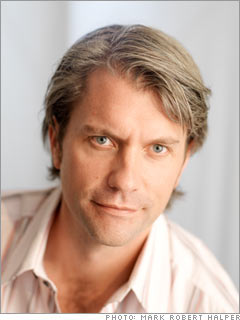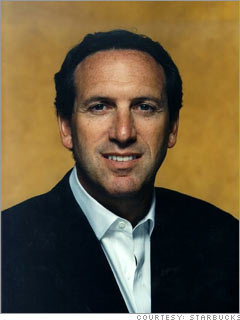 1. Sergey Brin :: Co-founder of Google
1. Sergey Brin :: Co-founder of GoogleSucceed With Simplicity
Simplicity is an important trend we are focused on. Technology has this way of becoming overly complex, but simplicity was one of the reasons that people gravitated to Google initially. This complexity is an issue that has to be solved for online technologies, for devices, for computers, and it's very difficult. Success will come from simplicity. Look at Apple, the success they have had, and what they are doing.
We are focused on features, not products. We eliminated future products that would have made the complexity problem worse. We don't want to have 20 different products that work in 20 different ways. I was getting lost at our site keeping track of everything. I would rather have a smaller set of products that have a shared set of features.
 2. Chris DeWolfe :: Co-founder, Myspace
2. Chris DeWolfe :: Co-founder, MyspaceKeep Social Networks Social
The key is to be true to your community's norms and values. You can't just force yourself on people and try to sell them something they don't want - that's good advice for marketers generally, but particularly on community-driven sites like MySpace. You have to find ways to add value to your members' lives while being consistent with your brand's identity.
 3. Rachael RayChef :: Author, and Entrepreneur
3. Rachael RayChef :: Author, and EntrepreneurTurn Your Passion Into an Empire
You have to be open-minded when those early opportunities present themselves. Take advantage of them, whether they're going to make you a lot of money or not. I did 30 Minute Meals for five years on local television, and I earned nothing the first two years. Then I earned $50 a segment. I spent more than that on gas and groceries, but I really enjoyed making the show and I loved going to a viewer's house each week. I knew I enjoyed it, so I stuck with it even though it cost me.
I've also learned that you can't be all things to all people. Whatever it is that you're successful at, that has to be the No. 1 goal. In my case, it's accessibility. So all of my products have to be usable, accessible, affordable. The olive oils we're developing with Colavita will be priced to be competitive with every other affordable olive oil. We chose to be in grocery stores, not fancy food stores, because that's where most of my audience shops. Our pots and pans have to be heavy-bottomed and sturdy but also affordable. Decide what it is that you are and then stay true to that thing. My brand is based very much on how I live my day-to-day life.
 4. Richard Branson :: Founder and Chairman, Virgin Group
4. Richard Branson :: Founder and Chairman, Virgin GroupLearn How to Say No (Even if You're Known as "Dr. Yes")
I turn people down with extreme difficulty sometimes, because the people I'm saying no to are people I don't want to discourage. And it should be difficult. Saying no shouldn't be an easy thing to do, and you have to be good at it. I often used to dodge doing it myself, and hide behind other people and delegate it, but if you're the boss, that isn't the right thing to do.
I remember when I was a 15-year-old asking Vanessa Redgrave or James Baldwin for an interview, and the fact that they took the time to respond meant an enormous amount to me. It inspired me. So it's extremely important to respond to people, and to give them encouragement if you're a leader. And if you're actually turning people down, if you must say no, whether it's for a job or a promotion or an idea they're proposing to you, take the time to do it yourself.
I met two big San Francisco entrepreneurs recently, and they said they get e-mail like this too, but they just dump it all in the dustbin. They don't try to answer at all. I asked them why, and they said, "The time we spend responding could be used to create something of value for our business." That may well be pragmatically right, but I still think it's morally wrong, and I suspect that anything that is morally wrong is ultimately bad for business.
 5. Howard Schultz :: Chairman, Starbucks
5. Howard Schultz :: Chairman, Starbucks
Dare to Be a Social Entrepreneur
The rules of engagement around building a brand have changed significantly over the past 10 to 15 years. Where companies at one time could spread their message through traditional marketing, consumers now seek an enduring emotional connection with the companies they patronize. The foundation of that connection is the most important characteristic of building a world-class brand: trust. Trust with your people and trust with your customers.
In the early years, we tried everything we could to exceed the expectations of our customers. But we knew that to achieve that goal we had to first exceed the expectations of our people. That was never more evident than in 1990, while we were still a private company that had yet to turn a profit. That was when we provided comprehensive health care to all of our employees, including part-timers. We also passionately believed that our people should share in Starbucks's success through ownership in the form of stock options - what we call "bean stock." It's hard to imagine advocating such expenses while we were building the business. This was not an expense but rather an investment.
Growth can cover up a lot of mistakes, and it has an intoxicating quality that sometimes makes it hard to see the need to continue to make investments ahead of the growth curve. Think of investments in your company as a metaphor for building a 100-story tower: You need to first lay a solid foundation to support future growth.
Reference: CNN Money
URL: http://money.cnn.com/popups/2006/biz2/howtosucceed/index.html
No comments:
Post a Comment